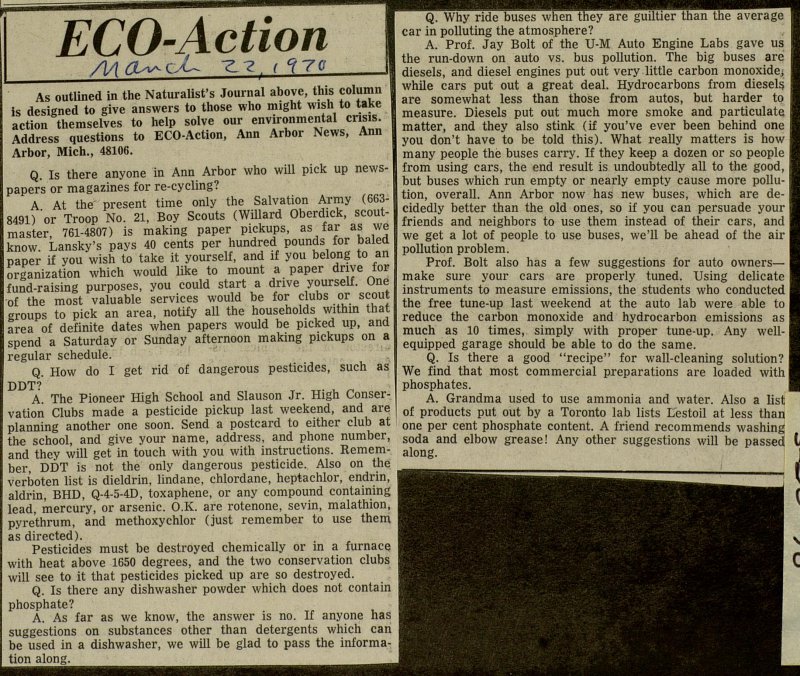Eco-action

As outlined in the Naturalist's Journal above, this column is designed to give answers to those who might wish to Uke action themselves to help solve our environmental crisis. Address questions to ECO-Action, Ann Arbor News, Ann Arbor, Mich., 48106. Q. Is there anyone in Ann Arbor who will pick up newspapers or magazines for re-cycling? A At the present time only the Salvation Army (6638491) 'or Troop No. 21, Boy Scouts (Willard Oberdick, scoutmaster, 761-4807) is making paper pickups, as far as we know Lansky's pays 40 cents per hundred pounds for baled paper if you wish to take it yourself, and if you belong to an organization which would like to mount a paper drive for fund-raising purposes, you could start a drive yourself. One of the most valuable services would be for clubs or scout groups to pick an área, notify all the households within that área of definite dates when papers would be picked up, and spend a Saturday or Sunday anemoon making pickups on a regular schedule. Q. How do I get rid of dangerous pesticides, such as DDT? A. The Pioneer High School and Slauson Jr. High Conservation Clubs made a pesticide pickup last weekend, and are planning another one soon. Send a postcard to either club at the school, and give your name, address, and phone number, and they will get in touch with you with instructions. Remember, DDT is not the only dangerous pesticide. Also on the verboten list is dieldrin, lindane, chlordane, heptachlor, endrin, I aldrin, BHD, Q-4-5-4D, toxaphene, or any compound containing lead, mercury, or arsenic. O.K. are rotenone, sevin, malathion, pyrethrum, and methoxychlor (just remember to use them as directed). Pesticides must be destroyed chemically or in a furnace with heat above 1650 degrees, and the two conservation clubs will see to it that pesticides picked up are so destroyed. Q. Is there any dishwasher powder which does not contain phosphate? A. As far as we know, the answer is no. If anyone has suggestions on substances other than detergents which can be used in a dishwasher, we will be glad to pass the information along. Q. Why ride buses when they are guiltier than the average car in polluting the atmosphere? A. Prof. Jay Bolt of the U-M Auto Engine Labs gave us the run-down on auto vs. bus pollution. The big buses are diesels, and diesel engines put out very little carbon monoxide, while cars put out a great deal. Hydrocarbons from diesels, are somewhat less than those from autos, but harder tp measure. Diesels put out much more smoke and particulate matter, and they also stink (if you've ever been behind one I you don't have to be told this). What really matters is how I many people the buses carry. If they keep a dozen or so people I from using cars, the end result is undoubtedly all to the good, I but buses which run empty or nearly empty cause more 1 tion, overall. Ann Arbor now has new buses, which are 1 cidedly better than the old ones, so if you can persuade your I friends and neighbors to use them instead of their cars, and I we get a lot of people to use buses, we'll be anead of the air I pollution problem. Prof. Bolt also has a few suggestions for auto owners- I make sure your cars are properly tuned. Using delicate I instruments to measure emissions, the students who conducted I the free tune-up last weekend at the auto lab were able to I reduce the carbon monoxide and hydrocarbon emissions as I much as 10 times, simply with proper tune-up. Any 1 equipped garage should be able to do the same. Q. Is there a good "recipe" for wall-cleaning solution? I We find that most commercial preparations are loaded withl phosphates. A. Grandma used to use ammonia and water. Also a list of producís put out by a Toronto lab lists Lestoil at less than one per cent phosphate content. A friend recommends washing soda and elbow grease! Any other suggestions will be passed along.